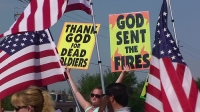Everyone knows about the Westboro Baptist Church, the Kansas institution best known for demonizing murdered college student Matthew Shepard and protesting military funerals with anti-gay signs. Most recently, the U.S. Supreme Court ruled for the church’s right to have these demonstrations under the First Amendment.
Fresh from this victory, Westboro went on tour to Kentucky, and landed at St. Lawrence Catholic Church in southwest Louisville yesterday. After all, according to them, God hates Catholics too.
Several hundred counterprotesters showed up to battle the message of hate—a message that most would agree does fly in the face of basically decent, reasonable people of all stripes. But while the Westboro gang seems to enjoy being celebrated for their controversy, a small number of those who came to speak against them sunk to their level, holding their own signs of condemnation—against the WBC.
Such digression is not uncommon. In the early ‘90s I covered a Ku Klux Klan rally in Indianapolis as a reporter. Easily a thousand people showed up, ostensibly to protest the appearance of half a dozen guys, tops. It turned into a free-for-all, with everyone who had an opinion on something—gay rights, women’s rights, NAFTA—coming out with signs. Inevitably, there were scuffles between black folks and skinheads, but the KKK guys just stood there, glowering at the crowd as the masses created their own violence.
You do not need to throw a punch to incite—or demonstrate—violence. But it helps.
Although I don’t completely understand the intersection of hate speech and law-protected free speech, I knew that the Louisville counterprotesters would significantly outnumber the protestors (who, I understand, often threaten to show up somewhere but don’t always). While logic suggests that ignoring the bullies will make them go away, having no counterprotesters show up would have been a sign of tacit approval.
So on Sunday, did love win the day? In numbers, yes. The sheer numerical superiority of the anti-Westboro, anti-hatred counterprotesters certainly bears this out. I’m not even going to attempt to psychoanalyze the WBC, but I simply don’t understand how God (or the concept of a peaceful supreme being) can hate anyone or anything.
As for violence, all that was needed was for Westboro to appear; by and large, the locals were peaceful and showed that they certainly were not anti-good, but anti-evil.
So when we speak of “the good people of Louisville,” that phrase now has a new meaning. Louisville, in those representative hundreds, chose peace over antagonism. Louisville, 1. Westboro Baptist Church, 0.
Contact the author at leecopywriting@gmail.com or www.leecopywriting.com.
Photo: Flickr/k763


